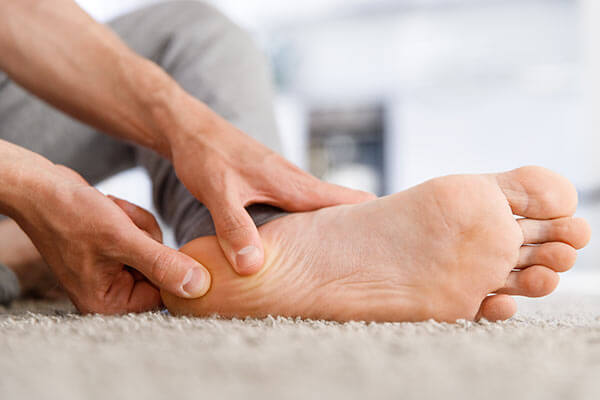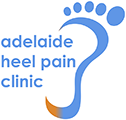Plantar Fasciitis Treatment Prospect
If heel pain is disrupting your ability to work, stay active, or complete daily tasks, plantar fasciitis could be the cause.


What is Plantar Fasciitis?
Supporting the arch of your foot, the plantar fascia is a thick band of tissue running from heel to toe. Inflammation of this essential structure leads to plantar fasciitis, a condition that can cause severe heel pain and affect daily movement.
The Adelaide Heel Pain Clinics near Prospect regularly treat heel pain, with plantar fasciitis accounting for about 50 cases per day. Although common, it’s a condition that requires immediate attention. Research highlights that 50% of sufferers continue to feel pain after five years, and 45% still experience symptoms after ten. Early consultation with a podiatrist is essential to avoid long-term suffering.
Symptoms of Plantar Fasciitis
Plantar fasciitis is commonly marked by sharp heel pain that typically occurs on the bottom of the foot near the heel. This pain often worsens after long periods of rest, like sleeping or sitting for extended durations. Other signs can include swelling, tenderness, limping, and pain spreading across the sole of the foot.


What Causes Plantar Fasciitis
Excessive pressure on the plantar fascia can result in irritation and inflammation, causing heel pain associated with plantar fasciitis. Strenuous activities that involve repetitive impact, such as running, dancing, or gymnastics, often contribute to the problem. Other factors that raise the risk include weight gain, ageing, pregnancy, long periods of standing, and foot structures like flat feet or high arches.

Ultimate 7 Step Checklist to Heal Your Morning Heel Pain
Tired of Limping?
Book an Appointment to Treat Your Heel Pain Today!
Treatment of Plantar Fasciitis
Adelaide Heel Pain Clinics handle dozens of plantar fasciitis cases daily, offering expert care for heel pain of all levels. Our comprehensive treatment options allow us to create personalised care plans suited to your specific needs, helping you find relief and get back to your daily routine.
Adelaide Heel Pain Clinic proudly provides expert plantar fasciitis treatment to residents of North Adelaide, Eastwood, Parkside, Glenside, Frewville, Fullarton, Highgate, Myrtle Bank, Brompton, Prospect, Walkerville, Unley, St Peters, Norwood, Thebarton, Mile End, Glenunga and surrounding suburbs.

Radial Shockwave Therapy
Radial shockwave therapy offers a powerful solution for heel pain, requiring no recovery time and posing no long-term side effects. We provide this treatment regularly for patients experiencing various types of heel pain.

Focal Shockwave Therapy
Focal shockwave therapy machines are rare in Australia, and our clinic proudly houses the only one in South Australia. This state-of-the-art treatment provides one of the most effective methods for relieving heel pain.

Dry Needling
Dry needling is considered a top treatment for tight muscles. It involves using small acupuncture needles to target trigger points and ease muscle discomfort.

Orthotics
Custom orthotics provide personalised comfort and support for any type of shoe. Designed specifically for your foot, they offer a treatment option tailored to your unique needs.

Low-Level Cold Laser
A less painful option than hot lasers, low-level cold lasers are an innovative advancement in podiatry treatments and could be the perfect choice for you.

Exercise Rehabilitation
Why settle for a one-size-fits-all approach? A podiatrist can create a personalised exercise rehabilitation plan tailored to your pain, health, and goals, offering remarkable benefits for your recovery.
Everything You Need to Know About Plantar Fasciitis
How are plantar fasciitis and heel spurs different?
Simply put, no. While plantar fasciitis and heel spurs are often confused due to their similar symptoms, they are distinct conditions. Plantar fasciitis involves inflammation of the ligament, whereas heel spurs are related to bone growth.
What are the most supportive shoes for plantar fasciitis?
The best shoes for plantar fasciitis depend on your daily activities and specific foot requirements. There’s no universal solution, so it’s important to work with a podiatrist to find the right support for your needs.
Can I continue walking or running if I have plantar fasciitis?
Healing your plantar fascia requires rest from high-strain activities like running. That said, exercise is still vital for your health. Low-impact activities, including swimming or cycling, are excellent options that won’t worsen your heel pain.
Can plantar fasciitis run in families?
There is no genetic factor linked to the development of plantar fasciitis. It isn’t an inherited condition, and there’s no evidence suggesting a genetic connection.
How does plantar fasciitis pain feel?
Patients with plantar fasciitis often describe the pain as a sharp, stabbing sensation near the bottom of the foot, especially close to the heel. The discomfort usually worsens after periods of rest, such as upon waking or after sitting for an extended time.
At what point should I seek professional care for plantar fasciitis?
Addressing heel pain early is essential. If you’re experiencing discomfort, book an appointment with a podiatrist right away to prevent further complications.
Are compression socks effective for plantar fasciitis?
Yes, compression socks can help ease plantar fasciitis symptoms by providing arch and ankle support, which limits excessive movement and improves alignment. For personalised guidance, consult a podiatrist.
What causes increased plantar fasciitis pain after waking up?
When the plantar fascia stays still for long periods, it tends to shorten. This makes the first few steps after waking up or following extended sitting or standing particularly painful, as stretching it out again can cause discomfort.

Book Online in less than 60 Seconds
Join over 20,000 South Australians who are now pain free!
